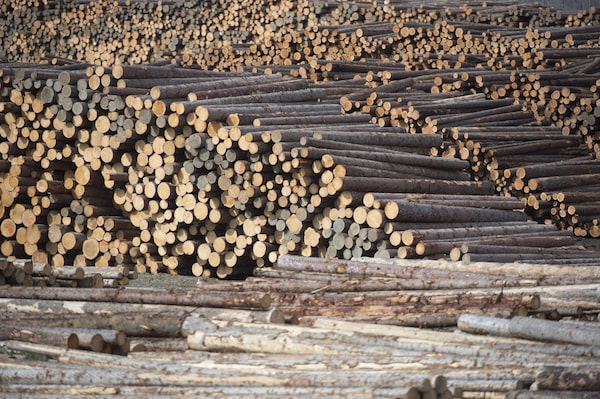
Softwood lumber sits in piles at Tolko Industries in Heffley Creek, B.C., on April, 1, 2018.JONATHAN HAYWARD/The Canadian Press
The British Columbia government is deferring a timber harvesting fee charged to forest companies in an effort to help the struggling industry survive during the COVID-19 pandemic.
Forest Minister Doug Donaldson said Thursday the government will not collect stumpage fees for the next three months to help forest companies with their finances during the crisis.
He said there are 45 B.C. sawmills closed indefinitely or shut down permanently, impacting 7,000 workers. The timber export market is in steep decline, especially in the United States where housing starts have slowed and timber prices have dropped, said Donaldson.
“From November to the end of February we were averaging over $400 for one thousand board feet for lumber exports to the U.S. and now, checking today, we’re about $319 for one thousand board feet,” Donaldson said at a news conference. “That’s a significant drop in a short period of time.”
But he said if export markets start to rebound, many of the curtailed mills can start up operations. Donaldson said the three-month stumpage payment reprieve can help companies endure until markets improve.
Stumpage is the fee forest operators pay the province to harvest, buy or sell trees from Crown land.
“The deferral, with interest, will leave eligible companies with an estimated $80 million in the short term, so they can pay employees, pay contractors and pay other bills,’ Donaldson said. “In conversations with the sector, a stumpage deferral was a primary request to support the industry and provide relief.”
The Council of Forest Industries, which represents the majority of B.C.’s lumber and pulp producers, said the announcement will help the industry during the pandemic.
“The deferral of stumpage fees is an important short-term measure to help alleviate some of the unprecedented financial pressure brought on by the COVID-19 crisis,” council president Susan Yurkovich said in a statement. “It will help B.C.’s forest companies put people back to work in communities as markets come back and we move toward economic recovery.”
Donaldson said the deferral may help some companies get back to work sooner and could save other firms from shutting down completely.
He said he was confident the initiative would withstand possible challenges from the U.S. lumber lobby under the Canada-U.S. softwood agreement. Donaldson said the deferral is not a subsidy because it must be repaid, with interest.
Our Morning Update and Evening Update newsletters are written by Globe editors, giving you a concise summary of the day’s most important headlines. Sign up today.